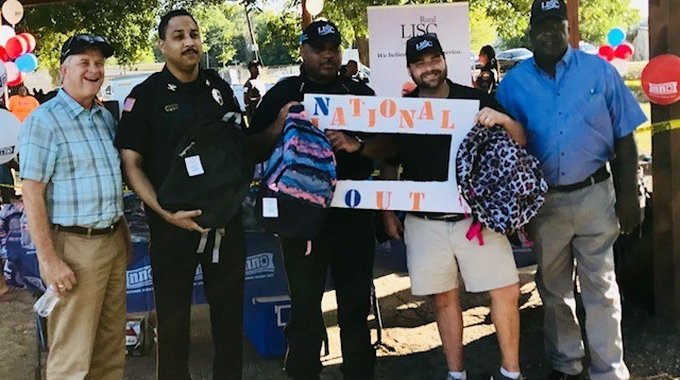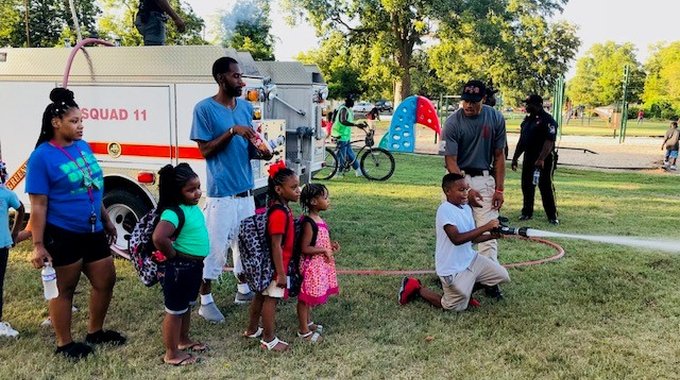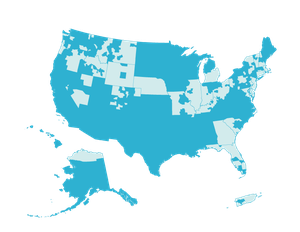The city of Greenville, MS sits on the banks of the Mississippi River, at the heart of the agricultural Delta. It is also a birthplace of the Civil Rights movement, where community leaders and residents are carrying on the fight for social and economic justice in the long-underinvested region. As part of our celebration of Black History Month, we are highlighting the work of Greenville’s chief of police, Delando Wilson, who partners with LISC in his wide-ranging efforts to build a safer, more prosperous and racially equitable Greenville.
When Delando Wilson was a child, he knew he would grow up to be a police officer. “It was always something I wanted to do,” he recalls. “I wanted to help people.”
But he never imagined the directions police work would take him. Today, as the chief of police in Greenville, Mississippi, less than 10 miles from his birthplace, Wilson is playing a central role in the revitalization of his town, in creating opportunity for African-American youth there and in helping uproot racial inequities that have kept residents of color—and the region as a whole—from flourishing.
Greenville, and surrounding Washington County, were a crucible of the Civil Rights movement. The town was once home to Fannie Lou Hamer and the site of Freedom City, where unemployed farm workers occupied buildings at the Greenville Air Base and called on the federal government to redress the poverty, hunger and poor education that was endemic in so many Delta communities. Both the spirit of that movement, and the challenging conditions of many people’s lives, persist to this day.

“The Mississippi Delta has its challenges economically and you see a lot of crime because of those economics,” says Wilson. “But you also have people that want it to be a part of solving that economic problem. If you have good public safety, you have better opportunities for your city. We want to be a part of that.”
Along with other city leaders, local non-profits and like-minded residents, Wilson realized that parks were an important nexus for tackling the roots of Greenville’s crime issues, and a way to reach out to young people and create a greater sense of community safety.
Listen to Delando Wilson describe his work in Greenville:
One particular park was at the top of his list: Named in the 1950s for a Greenville schoolteacher, Maude Bryan Park sits in a neighborhood just to the east of the Mississippi River banks that was off-limits to black residents before desegregation. “After integration, Greenville had a big exodus of whites moving to the outer limits of the county, which made this part more predominantly black,” says Wilson. Racist disinvestment followed, and the park fell into disrepair and became a crime hotspot. “You had dealers in the area selling drugs in the park, children couldn’t play there.
With support from Rural LISC and a $50,000 grant from Walmart Foundation's Diversity and Inclusion Fund, the police department and other groups began organizing clean-ups, refurbished the baseball field and built a volleyball court. They tamed the vegetation and organized programming for children and families.
Another LISC grant recently helped fix lighting that had been malfunctioning for seven years, meaning the park can now stay open at night, offering a green place where neighbors can exercise or cool off on summer evenings. Greenville’s Rotary Club has also refurbished the park’s bathrooms and concession stand, replaced playground equipment and added new signage and greenery to the park.

“Refurbishing this park is justice come full circle,” says Justin Burch, a senior program officer with Rural LISC who has worked closely with Wilson’s department and LISC CDC partners to refurbish the park. “Maude Bryant was once a segregated park. The neighborhood and the town are predominantly African-American and the once vibrant park has fallen on hard times. It’s important to make sure we maintain these green spaces so that current residents have the same opportunities to recreate, play ball, and enjoy nature."
As transformative as the renovations are, says Wilson, equally key to creating sustainable change is engaging people who had been using the park for illicit activities. “We didn't go in and arrest or run the drug dealers out,” says Wilson. Instead, “we had conversations with them and asked them to become a part of the restoration of this park. And they did. They became almost like the security of the park. They said, ‘this is for our children and the neighborhood. We don't want to be a part of the problem anymore.’” Integrating disconnected residents is “a model we want for our entire city,” Wilson adds. “[People] want to be a viable part of the community. If they are given the opportunity, they will become that.”
Safe, lively parks, of course, are only a partial solution to the town’s historic challenges. Wilson knows that Greenville needs more jobs, more investment, more trust building. He’s optimistic about new businesses opening, like the hotels catering to tourists who come to Greenville for its casinos, access to nature and the famous annual Mississippi Delta Blues & Heritage Festival.
But until Greenville’s economy is thriving, and its prosperity equitably shared by all its residents, youth in particular lack activity and opportunity, says Wilson. “And that leads to other things, things that are not so good for children. The challenge is to keep them involved. And not just sports, but activities in the community and the politics of the city, like opportunities to be on the debate team or the mock trial team or the mayor’s youth council.
To that end, Wilson and his department have also established a popular outreach program where officers visit schools each month to talk to kids about interacting with police, career opportunities in law enforcement and much more. They also run summer “junior” police academy, where young people undergo a mini training camp and learn about detective work and other aspects of life on the force.
Racial equity is woven through all these activities, says Wilson, and creating a safer city is critical to that equity. “It's coming together,” he says. “If others are going to hold up their end of the bargain, in the police department we definitely have to hold up our end as far as the public safety. I think, with all those factors, we can become the best of what we used to be and what we want to be.
